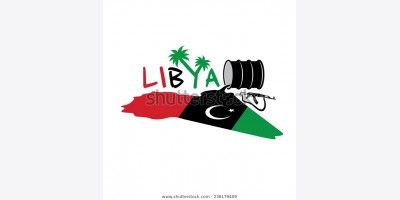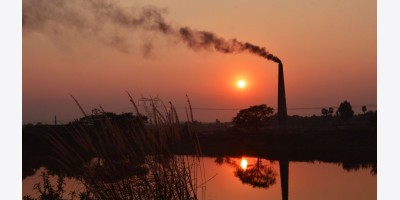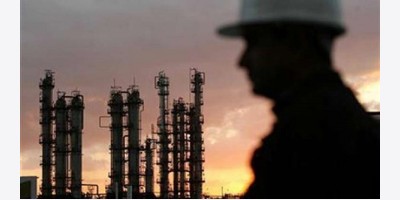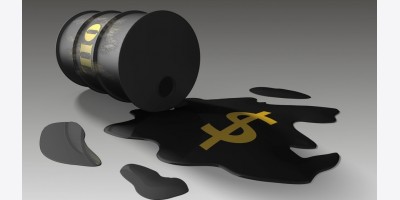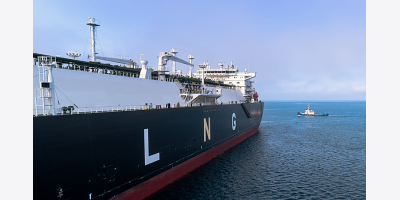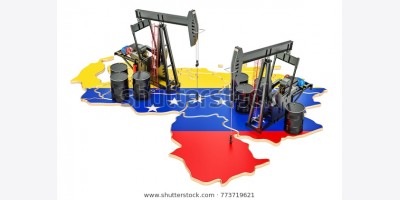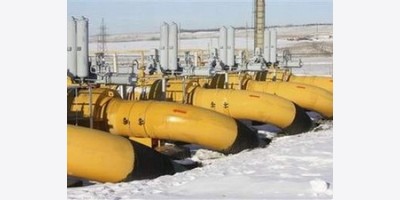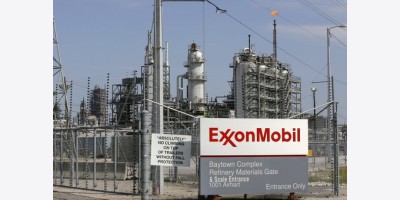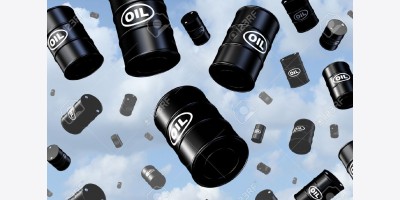Fire at Petrochina's Lanzhou refinery after leak
Source: Reuters
SHANGHAI, Aug 4 (Reuters) - Firemen are fighting a blaze at PetroChina's subsidiary refinery and petrochemical plant in northwest China, company officials said on Monday.
The fire that broke out at 8.39 a.m. local time (0039 GMT) was triggered by a leak at an 300,000 tonne-per-year air separation unit, official Xinhua News Agency reported.
A Beijing-based PetroChina media official said so far no casualties have been reported.
It was not immediately clear if other main production facilities were affected by the fire.
The Lanzhou plant, in northwestern Gansu province, is one of the country's oil refining hubs. It operates crude refining capacity of just over 200,000 barrels per day and also an affiliated petrochemical complex.
On Saturday, China suffered its worst industrial accident in a year when an explosion killed at least 69 people and injured more than 120 at a factory that makes wheels for U.S. carmakers, including General Motors. (Reporting by Fayen Wong and Chen Aizhu; Editing by Michael Perry)
Rosneft deals beat EU sanctions
Written by Sarah Parker Musarra — August 3rd, 2014 | 156 Views
Rosneft and North Atlantic Drilling Ltd. (NADL) executed multiple long-term offshore drilling contracts at the end of July, just before the newest round of European Union (EU) and US-issued sanctions were enacted. Rosneft committed to six offshore drilling units until 2022. The rigs will head to Russian waters beginning in 2015-2017, NADL said.
The executed contracts include five-year contracts for the West Navigator, West Rigel, and West Alpha semisubmersibles, two newbuild CJ-54 class rigs, and a 2.5 year contract for a Gusto-class jackup rig.
The contracts are a result of the investment and cooperation agreement between Rosneft, NADL and Seadrill Ltd. executed in St. Petersburg on 24 May in a signing ceremony led by Russian Federation President Vladimir Putin. At that time, six letters of award were signed for the harsh environment drilling rigs, with Rosneft saying in a statement that the use of up to 9 rigs was being considered. Alf Ragnar Lovdal, NADL's chief executive officer, hailed the agreement as a "landmark transaction."
NADL placed the total revenue potential for the six contracts exclusive of mobilization at approximately US$4.25 billion. According to the agreement, which the company said was consistent with the initial agreement's provisions, any break rights expire after 100 days.
Seadrill Ltd. is the majority leader of the Norwegian drilling rig company, which currently has nine drilling rigs in its fleet.
The EU adopted another packet of sanctions related to Russia's role in the Ukranian crisis effective 1 August targeting "sectoral cooperation and exchanges with the Russian Federation." Among other measures, the sanctions are designed to "curtail Russian access to certain sensitive technologies that can be used for oil production and exploration." At the time of this writing, the US has not yet followed suit with its expected sanctions.
The new package was formally adopted by the EU on 31 July. Speaking to Bloomberg, Seadrill Chief Financial Officer Rune Magnus Lundetrae said the contracts could proceed because they were signed 29 July, before the sanctions took effect.
Also executed on the wire was an US$150 million, 2.5-year agreement between Rosneft, NADL and Northern Offshore Ltd. for the use of Northern Offshore's Energy Endeavor jackup.
"[The sanctions are] meant as a strong warning: llegal annexation of territory and deliberate destabilization of a neighboring sovereign country cannot be accepted in 21st century Europe. ... The European Union will fulfil its obligations to protect and ensure the security of its citizens. And the European Union will stand by its neighbors and partners," the EU said.
© 2014 OilOnline & AtComedia, LLC. All Rights Reserved.
Libyan unrest could put its oil exports at risk
August 4, 2014, 2:32am
A SURGE in violence in Libya has led to Britons being evacuated, with analysts warning that the country’s oil exports hang in the balance.
Libya has been in the throes of political instability and social unrest since a coup toppled former leader Muammar Gaddafi in 2011.
The current flare-up between rival militant groups has led to more than 200 deaths in the capital Tripoli and the eastern city of Benghazi over the past fortnight.
The British embassy in Tripoli is set to suspend its operations today and relocate to neighbouring Tunisia, with all the remaining staff set to leave.
British ambassador to Libya Michael Aron told the BBC that staff would return to the embassy “as soon as security allows”.
The outbreak of violence has sparked concerns that Libya’s plans to ramp up oil production could be hindered. Libyan rebels last month agreed to allow the resumption of oil exports from two major ports, ending an almost year-long blockade.
“The current unrest is a definite risk to Libya’s oil exports and things will get worse before they get better,” oil and gas analyst Malcolm Graham-Wood told City A.M.
“The problems don’t seem to have hindered production so far but the situation is by no means sorted.”
Libya, which has the largest oil reserves in Africa, used to produce 1.4m barrels of oil per day before rebels seized the ports last year. The country’s current output is running at around 500,000 barrels a day.
On Wednesday, British Airways suspended flights to and from Tripoli until 5 August, due to the deteriorating security situation at the airport.
The Foreign and Commonwealth Office currently advises against all travel to Libya and says that a limited number of commercial departure options are still available, but may change without notice.
Land routes remained open but the security situation could change very quickly, the FCO said.
City A.M.
Germany is in favour of tough Russia sanctions, despite cost
August 4, 2014, 2:27am
German Vice-Chancellor Sigmar Gabriel yesterday said that tough economic sanctions against Russia were necessary despite them likely to hurt his country’s economy.
The EU imposed sanctions on Russia’s banking, defence and energy sectors because its support for separatists in eastern Ukraine.
Despite extensive trade ties with Russia, Chancellor Angela Merkel is a firm advocate of the tougher sanctions after Malaysian Airline MH17 was downed by over Ukraine.
“What would happen if the EU didn't react?” Gabriel, who is also Germany’s economy minister and head of the centre-left Social Democrats (SPD), told the ZDF TV channel.
“If all the lessons learned in Europe are that someone can start a civil war in a neighbouring country and nothing happens, then it would cost a lot more than a few percentage points of possible growth.”
City A.M.
FERC Approves Freeport LNG Export Project
Written by OilOnline Press — August 3rd, 2014 | 60 Views
The Federal Energy Regulatory Commission (FERC) authorized Freeport LNG Development, L.P. to site, construct, and operate facilities to liquefy and export domestic natural gas from its existing liquefied natural gas (LNG) import terminal located near the city of Freeport, Brazoria County, Texas.Freeport_LNG_Quintana_Island_Terminal.jpg
The Freeport Liquefaction Project includes the construction and operation of a liquefaction plant with three trains, each with a capacity of 4.4 million metric tons per annum, for total liquefaction capacity of 1.8 Bcf/d. The project also includes pretreatment plant facilities that will interconnect with several pipelines, as well as facilities to allow bi-directional flow of gas through the existing Freeport Pipeline.
In addition, FERC authorized Freeport LNG’s Phase II Modification Project that would revamp the previously authorized, but unconstructed Phase II Project. The Phase II Modification Project comprises three major components: reorientation of the Phase II dock, modification of the transfer facilities, and modification of access roads at the terminal.
The two projects would be constructed together at Freeport’s existing Quintana Island terminal.
The order adopts FERC environmental staff’s recommendations by requiring the company to adhere to more than 80 conditions to mitigate potential adverse environmental impacts. The U.S. Department of Energy has conditionally approved Freeport LNG’s export of gas to both Free Trade Agreement and non-Free Trade Agreement countries.
This is the third LNG export project authorized by FERC. There are currently 10 LNG export projects that have filed formal applications pending before the Commission, and there are three LNG export projects in the prefiling process.
© 2014 OilOnline & AtComedia, LLC. All Rights Reserved.
Iran to Add 7mln Barrels to Crude Storage Capacity by March
TEHRAN (FNA)- The Petroleum Engineering and Development Company (PEDEC) is building ten concrete crude oil storage facilities in oil-rich provinces in line with the oil ministry's plan to secure the country's flow of crude exports in case of halts in production, energy officials said.
PEDEC Chief Abdolreza Hosseinnejad said the facilities are already 85 percent completed.
He further added that the tanks are likely to come on stream by March next year.
The facilities are being built for storing a total of seven million barrels of crude oil. They will be the first experience in concrete storage tanks by the National Iranian Oil Company (NIOC).
They are under construction in the Southwestern Province of Khuzestan and the Southern province of Bushehr.
Concrete storage facilities’ life cycle is estimated at 50 years or more. They are resistant to fire and do not need periodic maintenance.
Iran ranks the third globally in terms of oil reserves while having the world's second-largest natural gas reserves after Russia with 34 trillion cubic meters of natural gas reserves.
Fars News Agency (FNA)
By Moming Zhou Aug 4, 2014 6:00 AM GMT+0700
Oil speculators bet right on prices after a fire at a refinery supplied by the biggest U.S. crude hub curbed demand and drove futures to a six-month low.
Hedge funds and other money managers trimmed their net-long position again in the week through July 29, extending the drop from this year’s peak in June to 22 percent, U.S. Commodity Futures Trading Commission data show.
West Texas Intermediate crude fell 6.8 percent in July, the most in more than two years. CVR Energy Inc. (CVI) shut the Coffeyville refinery in Kansas after a fire July 29, reducing purchases from Cushing, Oklahoma, the delivery point for New York futures. Refiners cut back operating rates as gasoline demand dropped and fuel stockpiles increased.
“Coffeyville strikes right at the heart of Cushing and it’s going to have an outsized impact on Cushing inventories,” said John Kilduff, a partner at Again Capital LLC, a New York-based hedge fund that focuses on energy, by phone Aug. 1. “It’s pushing WTI prices lower and may continue to do so. The demand outlook is building pressure on prices.”
Oil futures fell $3.45, or 3.3 percent, to $100.97 a barrel on the New York Mercantile Exchange in the period covered by the CFTC report. Prices slid to $97.88 on Aug. 1, the lowest settlement since Feb. 6.
Four Weeks
The 115,000-barrel-a-day Coffeyville refinery may be shut for four weeks, Chief Executive Officer Jack Lipinski said July 31 on an earnings call. IIR Energy, an energy information provider based in Sugar Land, Texas, said July 29 that some units at the plant would restart within 72 hours.
Inventories at Cushing are near a six-year low and started declining in January after the southern leg of TransCanada Corp. (TRP)’s Keystone XL pipeline began moving oil from the hub to Gulf refineries. Supplies dropped to 17.9 million barrels in the week ended July 25, the lowest level since 2008, a U.S. Energy Information Administration report last week showed.
The Coffeyville shutdown came as U.S. refineries were already cutting back operations amid weak fuel demand and shrinking margins. Refineries operated at 93.5 percent of capacity in the week ended July 25, from 93.8 percent the previous week.
“They were running these refineries at very high levels for very long, and now they are going to cut the rates,” Carl Larry, president of Oil Outlooks & Opinions LLC in Houston, said by phone Aug. 1.
Weaker Demand
Gasoline demand fell to an average of 8.95 million barrels a day in the four weeks ended July 25, the weakest for this time of year since 2012, the EIA report showed. Inventories rose to 218.2 million barrels, the most since March. Consumption of the motor fuel in the U.S. typically peaks during the summer months.
The crack spread, a rough measure of the profit from processing a barrel of oil into gasoline, narrowed to $16.08 a barrel on July 24, the smallest since February. It settled at $17.38 Aug. 1, based on Nymex contracts.
The Bloomberg Commodity Index (BCOM) dropped 5 percent in July, the biggest monthly decline since May 2012. The Standard & Poor’s 500 Index fell 1.5 percent in July, the first monthly decrease since January. The Bloomberg Dollar Index gained 1.9 percent last month to the highest level since February. A stronger dollar can reduce the appeal of commodities traded in the U.S. currency.
Net-long positions on WTI slid 1,375 to 276,741 futures and options combined in the week ended July 29, according to the CFTC. Shorts position increased 2,193, or 7.4 percent, while longs gained 818.
Nymex Gasoline
In other markets, net-long bets on Nymex gasoline dropped 9.8 percent to 30,755. The futures slid 0.98 cent to $2.8709 in the report week. Regular gasoline at the pump, averaged nationwide, slipped 0.6 cent to $3.504 a gallon Aug. 2, the lowest for this time of year since 2010, according to AAA in Heathrow, Florida. The price has dropped 18 cents since June 26.
Money managers’ bearish wagers on ultra low sulfur diesel widened to 7,842 contracts from 1,520 a week earlier. The fuel gained 5.25 cents to $2.9067 a gallon in the report week.
Net longs on U.S. natural gas decreased 4.2 percent to 192,550 contracts. The measure includes an index of four contracts adjusted to futures equivalents: Nymex natural gas futures, Nymex Henry Hub Swap Futures, Nymex ClearPort Henry Hub Penultimate Swaps and the ICE Future.
Nymex natural gas rose 3.6 cents to $3.808 per million British thermal units during the report week.
WTI has tumbled 6.4 percent from its three-week high of $104.59 on July 21. Prices had climbed on concern that the downing of a civilian airplane in Ukraine on July 17 would increase tension with Russia and disrupt supplies from the world’s biggest energy exporter.
“All the fears of a disruption have gone away,” Gene McGillian, an analyst and broker at Tradition Energy in Stamford, Connecticut, said by phone Aug. 1. “The market is shedding all the speculative bets.”
To contact the reporter on this story: Moming Zhou in New York at mzhou29@bloomberg.net
To contact the editors responsible for this story: David Marino at dmarino4@bloomberg.net Bill Banker
©2014 Bloomberg L.P. All Rights Reserved
Tripoli Clashes Toll Rises by 22 as Libya Crisis Deepens
By Tarek El-Tablawy Aug 3, 2014 9:35 PM GMT+0700
Britain dispatched its navy to evacuate its nationals from Libya as 22 other people were killed as a result of militia feuds near Tripoli’s international airport that have plunged the oil producer deeper into chaos.
The U.K.’s move came as the government announced the latest death toll today, a day after most members of the North African country’s new legislature met in the city of Tobruk near the Egyptian border. It was their first meeting as a unit since elections were held to replace the General National Congress.
The choice of venue for the House of Representatives’ first session, which was delayed until Monday, reflects concerns about the collapse of security in Tripoli and in Benghazi, the nation’s second-largest city. More than two weeks of fighting between rival militias, and pro- and anti-Islamists have left about 200 dead and hundreds more wounded, according to state media.
The violence marks the most severe escalation of tensions in Libya since the 2011 ouster and killing of Muammar Qaddafi. Embassies from around the world, including the U.S., have suspended operations, withdrawn staff and sought to evacuate their citizens by ship or across the land border with Tunisia amid signs the OPEC producer may be sliding toward civil war.
Foreigners flee the violence in Libya at the southern border crossing at Ras Jedir, on August 3, 2014.
Britain’s HMS Enterprise arrived in Tripoli to evacuate British nationals, the Defense Ministry said in an e-mailed statement. Greece on Aug. 1 evacuated some of its nationals, along with other foreigners.
Battered Aircraft
The latest death toll was based on bodies received yesterday by hospitals in the capital Tripoli, according to the government’s announcement. Militias have been battling at the country’s main international airport, where rocket attacks and shelling have damaged or destroyed 90 percent of the planes parked there, the state-run Libya News Agency reported. The control tower was also struck and fuel storage tanks set ablaze, the news agency said.
The fighting at the airport pits pro-Islamist forces against a militia that has been guarding the facility and which is loosely aligned with a renegade general opposed to Islamists. A similar showdown in the eastern city of Benghazi has left scores dead, with the latest serious clashes erupting after Islamists attacked and overran army bases held by General Khalifa Haftar’s troops.
‘Deteriorating’ Conditions
The government’s statement, posted on its Facebook page, said efforts to broker a cease-fire in Tripoli face “obstacles” as a result of the “stubbornness of the groups attacking the city and them being unresponsive to repeated calls to consider the deteriorating humanitarian condition of the population of the capital.”
The government said it has been working to address the plight of residents, including those displaced by fighting. The conflict has prompted at least one hospital to declare force majeure in the past week as foreign staff fled the country, state media reported.
Libya holds Africa’s largest crude reserves and produced almost 1.6 million barrels a day of oil before Qaddafi’s death. Earlier this year, Libya became the smallest supplier in the Organization of Petroleum Exporting Countries and shipped 300,000 barrels a day in June, according to data compiled by Bloomberg.
To contact the reporter on this story: Tarek El-Tablawy in Cairo at teltablawy@bloomberg.net
To contact the editors responsible for this story: Andrew J. Barden at barden@bloomberg.net Alan Soughley
By Henry Meyer, Sara Khojoyan and Zulfugar Agayev Aug 4, 2014 6:00 AM GMT+0700
The leaders of Armenia and Azerbaijan plan to meet this week in a bid to defuse escalating tensions between the two countries after at least 15 soldiers were killed in the worst clashes in two decades.
The fighting in the past week in the disputed region of Nagorno-Karabakh has been the deadliest since the two former Soviet states signed a cease-fire in 1994. Armenian President Serzh Sargsyan will hold talks with his Azeri counterpart Ilham Aliyev in the Russian city of Sochi on Aug. 8-9, Armenian Prime Minister Hovik Abrahamyan said on the government’s website.
“We hope that serious arrangements will be reached during the meeting,” Abrahamyan said. “We are not afraid of war, I just think it is not clever to solve problems with wars in the 21st century.”
The skirmishes between the South Caucasus countries, which border Turkey and Iran, flared amid the worst geopolitical standoff since the Cold War between Russia and the U.S. over the conflict in Ukraine. A renewed war between Azerbaijan, an ally of the U.S. and Turkey, and Russian-backed Armenia has the potential to put NATO directly at odds with the government in Moscow, according to Timothy Ash, a London-based economist for emerging markets at Standard Bank Group Plc.
“Militarily, Armenia is still thought to have superiority, given Russian backing, but with its rising oil wealth, Azerbaijan has been re-arming rapidly,” Ash said yesterday by e-mail.
Facing off are 20,000 Armenian and Azeri troops, dug into World War I-style trenches sometimes only 100 meters (330 feet) apart, according to the Carnegie Endowment for International Peace.
Energy Route
The escalating death toll since July 31 has inflamed tensions between landlocked Armenia and its eastern neighbor Azerbaijan, the former Soviet Union’s third-largest oil producer and the only route for Caspian energy to Western markets that bypasses Russia.
Armenia took over Nagorno-Karabakh, a mountainous enclave about the size of Rhode Island, and seven adjacent districts from Azerbaijan in a war after the Soviet Union’s collapse in 1991. More than 30,000 people were killed and over a million displaced before Russia brokered a cease-fire in 1994.
Once an Armenian-majority autonomous region within the Azerbaijan Soviet Socialist Republic, Nagorno-Karabakh remains internationally recognized as part of Azerbaijan. Four United Nations Security Council resolutions were passed demanding an Armenian withdrawal from the area. About 700,000 Azeris were forced to leave the districts in what Azerbaijan describes as ethnic cleansing. The two nations’ presidents met in November in Vienna for the first time in two years.
NATO, Russia
Azerbaijan has forged closer ties with Israel and NATO-member Turkey and increased defense spending 27-fold to $3.7 billion a year in the past decade, outlays that exceed Armenia’s annual budget. Armenia hosts a Russian military base in its second-biggest town of Gyumri, near the Turkish border, and Russian troops guard Armenia’s borders with Iran and Turkey.
Azerbaijan, which signed a $45 billion contract in December with a BP Plc-led group to pipe natural gas to Europe, has repeatedly threatened to use force to regain control of the territory should peace efforts fail. Aliyev said in January he had “no doubts” that Azerbaijan will “restore its territorial integrity.”
‘Provocative’ Steps
Azerbaijan’s Foreign Ministry accused Armenia of “provocative” actions and said it “bears full responsibility for the evolving dangerous situation,” according to a statement on the ministry’s website.
The U.S., France and Russia, which are leading efforts to resolve the Nagorno-Karabakh dispute, urged Azerbaijan and Armenia to take immediate action to defuse tensions and respect the cease-fire, as well as resume negotiations.
Companies led by London-based BP have invested more than $40 billion in Azerbaijan’s oil and gas fields. Azerbaijan can pump as much as 1.2 million barrels a day of oil to Turkey through the Baku-Tbilisi-Ceyhan pipeline, which allows supplies to bypass Russia.
Eight Azeri and two Armenian troops were confirmed killed in clashes on July 31. Azerbaijan said it lost an additional four troops and an Armenian soldier was confirmed dead in fighting on Aug. 1-2. Another Azeri serviceman was killed Aug. 3, according to Nagorno-Karabakh’s armed forces.
Crimea Context
Russia’s annexation of the Ukrainian peninsula of Crimea in March and the continuing pro-Russian separatist rebellion in eastern Ukraine is inflaming the situation in Nagorno-Karabakh, Thomas de Waal, senior associate at Carnegie in Washington, said in a research paper posted on the research group’s website in June.
“In this context, people are wondering not about whether Karabakh creates a precedent for Crimea but whether it works the other way round,” de Waal said. “The truth may be that Crimea has placed Karabakh in a new vicious circle of destructive politics.”
With Russian President Vladimir Putin “cynical” about the chances of pursuing peace talks between Azerbaijan and Armenia, the chances of a diplomatic breakthrough are low, according to the Carnegie analyst.
As Azerbaijan bolsters its army with weapons such as drones, multiple-rocket launchers and attack aircraft, “we can be certain that a new conflict, however small, would be vastly more destructive than that of the 1990s,” he said.
To contact the reporters on this story: Henry Meyer in Moscow at hmeyer4@bloomberg.net; Sara Khojoyan in Yerevan at skhojoyan@bloomberg.net; Zulfugar Agayev in Baku at zagayev@bloomberg.net
To contact the editors responsible for this story: Balazs Penz at bpenz@bloomberg.net Paul Abelsky
By Grant Smith Aug 4, 2014 6:00 AM GMT+0700
First the U.S. shale-oil boom took away Nigeria’s biggest crude-export market. Now Africa’s biggest economy is depending on American fuel to power its vehicles and planes.
The CHART OF THE DAY shows how U.S. imports of Nigerian crude have almost converged with American sales of refined-petroleum cargoes like gasoline and kerosene shipped in the opposite direction. The U.S. gets less than 2 percent of its oil from Nigeria, compared with 7 percent in 2011, Energy Department data show. Nigeria imported more than half of its fuels from America at times in 2013, from less than a fifth three years ago, according to IHS Inc., a consulting firm.
Surging oil output in the U.S., most of it banned from export under decades-old laws, hands refiners on the Gulf Coast inexpensive feedstock to process into cargoes such as gasoline for sale overseas. Nigeria’s growing dependence highlights its battle to produce enough fuels domestically, according to Jamie Webster, an oil analyst at IHS in Washington.
“We’ve gone from taking all this crude from Nigeria, now we don’t take the crude and are instead sending crude there in the form of refined products,” Webster said by phone on July 25. “It’s an evolution of the relationship.”
The dwindling Nigerian shipments to the U.S. mean that disruptions to the African nation’s supplies from theft or militant attacks don’t trigger the kind of oil price rallies they generated a few years ago, he said.
“Nigeria is no longer quite as critical in setting global oil prices when things get tight,” Webster said. “From an energy security standpoint, the U.S. isn’t quite as worried” about losses in the Niger Delta.
To contact the reporter on this story: Grant Smith in London at gsmith52@bloomberg.net
To contact the editors responsible for this story: Alaric Nightingale at anightingal1@bloomberg.net Tony Barrett
By Dan Murtaugh and Jack Kaskey Aug 1, 2014 10:54 PM GMT+0700
As a tanker filled with disputed Kurdish oil sits off the coast of Texas for a fifth day, another shipment may be making its way to the East Coast.
The Minerva Joy left Dortyol, Turkey, a port used to export oil trucked from the Kurdish region of Iraq, on July 23 and is due to dock in Paulsboro, New Jersey, on Aug. 11, according to shipping data compiled by Bloomberg. It would be the sixth vessel carrying Kurdish oil to the U.S.
Shipping and U.S. customs data show that two of those earlier shipments may have been delivered to LyondellBasell Industries NV (LYB)’s refinery in Houston. The London-based petrochemical company said yesterday it will stop purchasing Iraqi crude after an ownership dispute arose associated with the recent shipments it purchased.
“We have canceled further purchases and will not accept delivery of any of the affected crude until the matter is appropriately resolved,” the company said in a written statement. Lyondell declined to comment on any specifics about the shipments.
On July 28, the Iraqi Oil Ministry persuaded a U.S. judge to order the seizure of 1 million barrels of oil inside a tanker anchored off Galveston, Texas, that it claims was illegally pumped from wells in Kurdistan.
The United Kalavryta is anchored 60 miles southeast of the Texas coast, as it has been since July 28, outside of U.S. territorial waters. The seizure ordered can’t be executed until it crosses that boundary. The ship loaded in Ceyhan, Turkey, where a pipeline from the Kurdish region of northern Iraq terminates.
U.S. Recognition
The U.S. officially recognizes Kurdistan as part of Iraq, although the Kurdish people have jockeyed with the Baghdad-based national government for autonomy for more than a decade. Oil revenue from the northern oil fields could fuel Kurdistan’s fight for independence.
Oil producers are working with the Kurdistan Regional Government to began extracting the estimated 45 billion barrels of reserves in the northern territory. The Kurdish government expanded its control over the resources in early June, when Kurdish Peshmerga armed forces took control of northern Iraq’s key oil hub, Kirkuk, after militants routed the Baghdad government’s army.
Iraq Government
The Iraqi government warned Kurdish officials to stop the exports through Turkey, which began in December, according to the complaint over the United Kalavryta. Gulf Keystone Petroleum Ltd. (GKP), which says it’s the leading operator in the Kurdistan region, said in its April 28 annual report that it began exports of Shaikan crude from the Kurdish region by trucking oil to the port in Dortyol.
Two oil shipments from Dortyol reached the U.S. in May, according to U.S. Customs data. One shipment of 265,167 barrels on board the Marinoula landed in Houston May 1. The other, 265,062 barrels of oil on the Lovely Lady, landed in Houston May 28.
The volumes match imports of Iraqi crude in May in Lyondell filings with the U.S. Energy Information Administration. The U.S. has never imported a barrel of crude from Turkey in EIA data dating back to 2000, and hadn’t received any shipment from Dortyol before crude cargoes starting in May, according to Customs data going back to 2013.
Other Cargoes
Other cargoes loaded in Dortyol have landed or are en route to the U.S. The Nounou brought 254,840 barrels of crude to Philadelphia on June 6, with Axeon Specialty Products LLC listed as the notify party on the bill of lading filed with U.S. Customs. Axeon operates a 70,000-barrel-a-day asphalt refinery in Paulsboro, New Jersey.
Axeon SP buys feedstock from mulitple sources and follows standard background and vetting procedures, spokesman Michael Drager said by e-mail. “Axeon SP does not disclose specific information regarding our commercial transactions and/or private conversations/consultations with any government agency,” he said.
The Minerva Rita may have unloaded petroleum late last month on the Houston Ship Channel after loading in Dortyol in June, according to shipping data compiled by Bloomberg.
The Minerva Joy lists Paulsboro as its destination after apparently filling with petroleum in Dortyol on July 23, according to shipping data. The ship is currently about 100 miles southwest of Portugal.
To contact the reporters on this story: Dan Murtaugh in Houston at dmurtaugh@bloomberg.net; Jack Kaskey in Houston at jkaskey@bloomberg.net
To contact the editors responsible for this story: David Marino at dmarino4@bloomberg.net Charlotte Porter
By Sara Khojoyan and Zulfugar Agayev Aug 3, 2014 8:12 PM GMT+0700
Leaders of Armenia and Azerbaijan plan to meet this week in a bid to defuse tensions after at least 15 soldiers were killed in a disputed border region.
The fighting in the past week has been the deadliest since the two former Soviet states signed a cease-fire 20 years ago. Armenian President Serzh Sargsyan will hold talks with his Azeri counterpart Ilham Aliyev in the Russian city of Sochi on Aug. 8-9, the prime minister of Armenia, Hovik Abrahamyan, said in comments posted on the government’s website.
“We hope that serious arrangements will be reached during the meeting,” Abrahamyan said. “We are not afraid of war, I just think it is not clever to solve problems via wars in the 21st century.”
The border skirmishes flared amid the worst geopolitical standoff since the Cold War between Russia and the U.S. over the conflict in Ukraine. A renewed war between Azerbaijan, an ally of the U.S. and Turkey, and Russian-backed Armenia has potential to put NATO directly at odds with the government in Moscow, according to Timothy Ash, London-based economist for emerging markets at Standard Bank Group Ltd.
“Militarily, Armenia is still thought to have superiority, given Russian backing, but with its rising oil wealth, Azerbaijan has been re-arming rapidly,” Ash said today by e-mail.
Energy Route
The escalating death toll since July 31 has inflamed tensions between landlocked Armenia and its eastern neighbor Azerbaijan, the former Soviet Union’s third-largest oil producer and the only route for Caspian energy to Western markets that bypasses Russia.
Armenians seized Nagorno-Karabakh, a mountainous enclave about the size of the state of Rhode Island, and seven adjacent districts from Azerbaijan in a war after the Soviet Union’s collapse in 1991. More than 30,000 people were killed and over a million displaced before Russia brokered a cease-fire in 1994. The two nations’ presidents met in November in Vienna for the first time in two years.
Azerbaijan, which signed a $45 billion contract in December with a BP Plc-led group to pipe natural gas to Europe, has repeatedly threatened to use force to regain control of the territory should peace efforts fail. Aliyev said in January he had “no doubts” that Azerbaijan will “restore its territorial integrity.”
‘Provocative’ Steps
Azeri Foreign Ministry spokesman Elman Abdullayev didn’t answer calls to his mobile phone today. Azerbaijan’s foreign ministry accused Armenia of “provocative” actions and said it “bears full responsibility for the evolving dangerous situation,” according to a statement on the ministry’s website today.
The U.S., France and Russia, which are leading efforts to resolve the Nagorno-Karabakh dispute, urged Azerbaijan and Armenia to take immediate action to defuse tensions and respect the cease-fire, as well as resume negotiations.
Companies led by London-based BP have invested more than $40 billion in Azerbaijan’s oil and gas fields. Azerbaijan can pump as much as 1.2 million barrels a day of oil to Turkey through the Baku-Tbilisi-Ceyhan pipeline, which allows supplies to bypass Russia.
Eight Azeri and two Armenian troops were confirmed killed in clashes on July 31. Azerbaijan said it lost an additional four troops and an Armenian soldier was confirmed dead in fighting on Aug. 1-2. Another Azeri serviceman was killed last night, according to Nagorno-Karabakh’s armed forces.
To contact the reporters on this story: Sara Khojoyan in Yerevan at skhojoyan@bloomberg.net; Zulfugar Agayev in Baku at zagayev@bloomberg.net
To contact the editors responsible for this story: Balazs Penz at bpenz@bloomberg.net Bruce Stanley, Keith Jenkins
Impact of EU oil sanctions on Rosneft not critical: company
Russia’s largest oil producer Rosneft said Friday it has assessed the impact of EU oil equipment sanctions on its activities as “not critical” and has already formed an understanding of how to ensure the steady supply of oil equipment from non-EU sources.
The EU earlier this week introduced new sanctions against Russia, banning supplies of technologies and equipment used for deepwater oil exploration and production, Arctic oil exploration and production, or shale oil projects to Russian oil companies. The US administration also announced similar sanctions on the Russian oil segment.
“Many positions from the [EU sanctions] list are not critical for the company; there are suppliers of similar goods in Russia and non-EU countries,” Rosneft said in a statement. “The company has a clear understanding of how to resolve the issue of equipment supplies, although the redirection of the purchases will take some time,” it added.
Rosneft was continuing to evaluate the potential impact of the EU sanctions on its operations, the company said. Earlier on Friday, Rosneft closed a deal to buy eight Russian and Venezuelan onshore oil service assets from Ireland-based Weatherford International. The two companies reached a sale-purchase agreement in mid-July, as well as an agreement on long-term cooperation in oilfield services.
Rosneft was unavailable for comment Friday on whether the EU sanctions would impact the cooperation agreement. On Wednesday, Rosneft also signed long-term offshore drilling agreements with North Atlantic Drilling Ltd. for the use of six of its rigs to 2022. The agreement would ensure that Rosneft implements its plans to run exploration in the offshore areas with harsh climate, the Russian company said at the time.
Rosneft plans to explore offshore Russia’s Arctic zone in partnership with PetroVietnam, Eni, ExxonMobil and Statoil. The joint Arctic exploration program with ExxonMobil is scheduled to start in August and its results are widely expected to serve as an indicator of overall prospects for hydrocarbon production in the Russian Arctic, which presents many technical challenges due to severe weather.
The EU sanctions, in force from Friday, allow for exemptions to be made for contracts or agreements concluded before August 1, and will be formally reviewed after three months to check on their effectiveness.
The EU and the US announced the latest round of sanctions against Russia after the downing of Malaysian Airlines flight MH17 in the conflict zone in eastern Ukraine. In mid-July, Rosneft became a target of the earlier round of US sanctions, which prohibited US persons and entities from providing mid- and long-term financing for the Russian oil company, as well as for Russia’s Novatek.
Iraq’s July Basrah Light crude oil exports up 103,000 b/d to 2.452 million b/d
Iraq exported an average 2.452 million b/d of Basrah Light crude in July, up 103,000 b/d from the Basrah Oil and Khor Al-Amaya terminals in southern Iraq, according shipping sources. In June, Basrah Light exports averaged 2.349 million b/d.
The specific gravity of Basrah Light in July averaged 28.63 API degrees, while in June the average was at 28.86 API degrees. The lowest specific gravity was at 26.55 API degrees with the highest at 29.86 API degrees.
The higher July Basrah Light export figures are due to liftings that spilled over from June, sources said. However, players are anticipating a decline of exports to about 2.19 million b/d, based on the latest August nominations.
The lower August figure is due to the State Oil Marketing Organization’s efforts to clear the backlog of loadings that arose from the outage of the Single Point Mooring off Basrah SPM 1 in mid-June.
Iraq’s SOMO guarantees the specific gravity of its Basrah Light crude oil at 34 API degrees and offers a $0.40 per one API degree de-escalator. A specific gravity of 28.63 degrees API would translate to a discount of $2.148/b to the July official selling price. Basrah Light’s July OSP for Asia was set at at the average of Platts Dubai and Oman assessments published in July minus $0.15/b, to Europe at average of Platts Dated Brent published in July minus $5.30/b and to the US is at ASCI plus $1.00/b.
Dubai assessments in July averaged $106.146/b while Oman was at $106.163/b. Dated Brent assessments in July averaged $106.635/b, according to Platts data. SOMO set the August Basrah Light OSP at the average of Platts Dubai and Oman assessments published in August minus $0.55/b, while for Europe it is the average of Platts Dated Brent published in August minus $5.75/b and to the US unchanged at ASCI plus $1.00/b.
Asian Aframax rates hit one-year high on demand for fuel oil storage
Worldscale rates for Aframaxes have increased sharply in recent weeks due to strong demand for time-charter business and long-haul voyages, resulting in the tightening of tonnages, market participants said Friday.
An aggressive drive by trading companies to take ships on short-term time charter for fuel oil storage around Singapore has driven up Aframax rates to new highs for this year. The key Indonesia to Japan route was assessed at w122.5 Friday, surpassing the previous high of w122 seen on January 2, Platts data showed.
The Persian Gulf to East route was also assessed at a one-year high of w125. Market participants said trading companies are currently buying and storing fuel oil, hoping to secure higher returns due to the expectation of rising prices later this month.
It has translated into some ships getting locked in time charters for storage purposes. Ships taken for time charter for 30 to 60 days include the Sanar 8, Andaman Sea, Desh Garima, Vermillion Energy and Ocean Queen by charterers such as ST Shipping and BP, brokers said.
“These are all fresh fixtures for time-chartered ships and don’t include renewals,” a Singapore-based Aframax broker said. As a result, this has removed some of the excess tonnage from the spot market, the broker said.
“There is still room for rates to increase because it will be at least another month before these ships are available for getting hired out again,” a second broker said.
Market watchers said the time charter of many of these ships may be extended if the expectation of rising fuel oil prices remained. FOB Singapore 380 CST high sulfur fuel oil was assessed Friday at $596.11/mt, with the cash differential at $2.63/mt.
In the Platts Market on Close assessment process, traders have been snapping up fuel oil cargoes, with traded volumes in July nearly doubling compared with the previous month. July saw 1.557 million mt of fuel oil traded in the MOC process in Singapore, compared with 873,000 mt in June. Brokers estimated spot fixtures reported for Aframaxes on the route from Indonesia to South Korea or Japan at 11 for July, compared with 17 for the same month last year.
Tropical Storm Bertha expected to have no effect on shipping market: trade
Tropical Storm Bertha is making its way through Caribbean tanker routes, but it is expected to have no impact on shipping in the region, sources said Friday.
“Looking at the charts this morning it doesn’t look like it is going to touch the US coast, so it looks like it will have no effect on the clean market,” a broker said.
“No one is talking about it in the market right now, but we’ll obviously keep an eye on it and see how it develops.”
If any ships are affected, it would be clean tankers, a charterer said. “The routes they take when going from the US Gulf Coast across the Atlantic take them right through the area where the storm is headed,” he said.
“There are a lot of ships that do that run, particularly [medium range].” According to the National Hurricane Center, Tropical Storm Bertha was located east of the southern Lesser Antilles islands Friday and has a projected path that will take it west-northwest toward the Bahamas this weekend.
Early Monday, the storm is expected to veer northward and head out to sea. “If it hits the Bahamas, then there will be some delays, but not very significant ones since there is not much loading going on there,” another broker said.
If a tanker finds itself in Tropical Storm Bertha’s path, the captain could decide to wait until the weather clears or find a different route.
“Sitting in an emission control area zone is expensive, though, [because the ship has to use low sulfur fuel],” the charterer said. “They can also change their course. It all depends on what the charterer wants and what the captain deems safe.”
Fifth cargo of Kurdish crude from Ceyhan completes loading, heads south
The tanker carrying the fifth cargo of Kurdish crude to load out of the Turkish port of Ceyhan is currently heading south through the eastern Mediterranean with a destination of Port Said in Egypt, according to Platts vessel-tracking software c-Flow. The crude tanker Kamari finished loading its cargo of 1 million barrels of medium sour crude from the Kurdish region of northern Iraq on Thursday.
Cardiff Tankers, owners of the Kamari, declined to comment. The flow of crude from Kurdistan has not yet been restarted following the lifting of the fifth cargo, an official from Turkey’s energy ministry said Friday.
The official said that prior to the lifting, the tanks at the Botas-operated Ceyhan terminal allocated for crude from Kurdistan were full and for that reason flow had been halted. He said that despite the completion of the lifting, flows have not yet restarted and as yet it is still unclear when it will be restarted.
The official also said it was unclear when the next lifting would occur. Only one of the five cargoes has been fully offloaded so far — the cargo discharged at Ashkelon in Israel, reportedly into storage, in June.
But according to market sources and ship-tracking data, part of the United Emblem’s 1 million barrel cargo was offloaded on Thursday, either via lightering vessels or onto another tanker. United Emblem is currently west of Malaysia.
The two remaining waterborne cargoes on United Leadership and United Kalavrvta are currently offshore Morocco and Texas, respectively. United Leadership has been outside of Morocco for nearly two months after reportedly being turned away from Mohammedia, while the oil on United Kalavrvta is currently the subject of a lawsuit in the United States.
Kenya to introduce oil, gas investment model by year end: government
Nairobi (Platts)--1Aug2014/736 am EDT/1136 GMT
The Kenyan government Friday said a petroleum industry plan that will guide investments in the oil and gas sectors will be released by the end of the year.
Energy principle secretary Joseph Njoroge said the World Bank had appointed PriceWaterHouseCoopers (PwC) to develop the plan as country moves closer to commercialization of oil discovered in the northern Turkana Basin.
"The petroleum master plan will provide a road map for investment in processing, transport infrastructure, storage and distribution facilities for domestic use as well export for production of crude oil and natural gas discovered," he said.
The plan will set long-term goals with a 10-year view as Kenya edges towards first oil in 2017.
Interest in exploration both onshore and offshore Kenya has increased after Tullow Oil and Africa Oil first struck oil in 2012. Since then, the companies have discovered an estimated 600 million barrels of oil resources, the minimum required for a commercial development.
The companies are expected to submit a field development plan by 2015.
The International Development Association, the long-term lending arm of the World Bank, has extended a $50 million loan to help fund the setting up of institutions to manage revenues from oil and gas discoveries.
"The petroleum master plan is being developed to enable the Kenyan government to adequately forecast and manage revenues as well to justify investment in extractive industries value chain," Njoroge said.
Kenya has 46 blocks, of which 44 are licensed to 23 companies. The government plans to offer seven new blocks as soon as a revised petroleum code is passed into law.
Kenya's cabinet secretary for energy and petroleum, Davis Chirchir, said in June he wanted parliament to approve the revised petroleum law in October, a move that would pave the way for a licensing round. The law is also expected to provide a framework for oil revenue management and could increase the government's take from oil operations and enforce more local content legislation.
--Kennedy Senelwa, newsdesk@platts.com
--Edited by Jonathan Dart, jonathan.dart@platts.com
Traders expect cuts in Sep OSP differentials for Saudi crudes on weak Asian demand
Singapore (Platts)--1Aug2014/737 am EDT/1137 GMT
Saudi Aramco may cut the official selling price differentials for September-loading crude cargoes for export to Asia amid weak refining demand in the region, most of the traders said this week.
"I think there will be a little cut, not big, across the board," a trader at a trading house said.
Saudi Arabia's main export grades are Arab Light and Arab Medium, the August OSP differentials to the monthly average of Platts Oman and Dubai assessments for which were set at a premium of $2.05/barrel and 5 cents/b respectively.
The formula, which typically uses the difference between Platts Dubai crude cash and swap assessments over the last five trading days of a month, is understood to play a role in setting the OSP differential for Arab Light. Some traders said they expected this formula to be abandoned for September-loading cargoes due to the underlying weakness in demand for crude oil from Asian refiners.
This follows sluggish gasoil cracks, which in turn has led to low margins in recent weeks.
In the last five working days of July, the spread between September cash Dubai and September Dubai swap averaged 77 cents/b, against an average of 69 cents/b in the last five days of June, according to Platts data.
Traders said they expected cuts of around 20-30 cents/b in the differential for Arab Light. One trader even put the cut at 70 cents/b due to the weak demand currently.
For Arab Medium, a trader said he expected a similar cut of around 25-30 cents/b. The cut in differential for Arab Heavy was likely to be less, around 15 cents/b, he added, citing some stability in the fuel oil crack to Dubai through July.
The discount of FOB Singapore 180 CST high sulfur fuel oil cracks for one month forward against Dubai crude oil narrowed to an average of $10.60/b in July, compared with $10.76/b in June.
The Arab Heavy OSP for August was set at a discount of $2.80/b to the average of Platts Oman and Dubai assessments.
The differential for Arab Extra Light, which for August was set at a premium of $3.95/b to the average of Platts Oman and Dubai assessments, could see a cut of between 15 cents/b and 20 cents/b with gasoil cracks edging lower throughout July.
Month on month, the gasoil crack swap to Dubai fell 23 cents/b to average $13.73/b in July, significantly lower than the average of $16.97/b seen in the first half of this year.
--Daniel Colover, daniel.colover@platts.com
--Edited by E Shailaja Nair, shailaja.nair@platts.com
Average July UK gas price hit 51-month low despite Ukraine/Russia-driven gains
London (Platts)--1Aug2014/949 am EDT/1349 GMT
The escalation of violence in Ukraine and accompanying rise in tensions between the West and Russia saw some upward movements to UK NBP gas prices throughout July, but overall monthly average prices were down from June as the market remained depressed by good supply and high storage levels.
Gas for the benchmark day-ahead contract averaged 37.52 pence/therm in July, which is the lowest monthly average since April 2010 when it fell to 32.80 p/th, and down 5% from June.
It's 43% lower than July 2013's 65.28 p/th.
At July 11, the contract saw its lowest closing price since September 2010. In the following days, however, new sanctions were imposed against Europe's biggest gas supplier, Russia, and the shoot-down July 17 of Malaysia Airlines Flight 17 over Ukraine took geopolitical concerns to a new level.
The contract closed at 41.50 p/th at July 28 -- it's highest close since June 16 -- before easing back to 39.25 p/th at the end of the month. The gains during the second half of July did result in the contract finishing the month's trading higher than where it began, a first for 2014.
The average month-ahead price throughout July was 38.09 p/th, down 6% on-month and 42% on the year.
Gas for delivery during the coming winter hit its lowest ever value during July -- closing July 10 at 54.85 p/th -- since Platts assessments began on the contract in September 2011. In its early days of trading, the contract had been valued in excess of 77.00 p/th. By the end of the month, market jitters stemming from the Ukraine/Russia situation saw it back up to 58.50 p/th.
The UK's National Grid said Thursday that if the crisis were to lead to an interruption of Russian gas flows through Ukraine, the EU could lose 207 million cubic meters/day of supply during the coming winter. To put in context, the UK's demand during the past winter was about 255 million cu m/d.
There is the potential, however, for Russia to re-route gas via the Yamal and Nord Stream pipelines which could reduce the impact to 117 million cu m/d, Grid said.
While the UK doesn't receive significant volumes of gas from Russia, both direct and indirect connections to European markets make it likely that UK gas supplies would change.
UK pipeline imports would fall, piped exports to the Continent would rise, and a boost in LNG tanker deliveries and domestic storage withdrawals would likely be needed to cover the shortfall, it said.
Grid said an initial disruption would lead to the bi-direction UK-Belgium Interconnector pipeline exporting between 20-58 million cu m/d rather than importing anywhere up to 74 million cu m/d if there's no cut to EU-bound Russian flows.
Norwegian flows into the UK would fall from 60-130 million cu m/d to 60-100 million cu m/d, the Dutch BBL pipeline would cut back from 10-45 million cu m/d to 0-30 million cu m/d and LNG imports would have to rise from 8-100 million cu m/d to 8-130 million cu m/d, Grid said.
Gas prices would likely have been more sensitive to the threat if the market wasn't as healthily stocked as it is.
Demand for gas has been comparatively low during 2014 with temperatures at the beginning of the year historically mild, which kept storage stocks high and meant for less of a need for injections during the summer.
Gas stocks at the UK's largest storage facility Rough were at their highest level for the time of year this decade, data from National Grid showed. Towards the end of July, the facility had close to 3.5 billion cubic meters, or 93% of capacity, which was much higher than the 2.4 Bcm or 64% capacity at the same time last year.
--Nathan Richardson, nathan.richardson@platts.com
--Edited by Kevin Saville, kevin.saville@platts.com
Platts LNG September Japan Korea Marker weakens to $10.575/MMBtu on Asia Pacific supplies
Singapore (Platts)--1Aug2014/832 am EDT/1232 GMT
The Platts LNG Japan Korea Marker for September fell 10 cents/MMBtu over the week to close at $10.575/MMBtu Friday, setting a new low for the year, as demand for September continued to remain weak from end users.
The JKM is at its lowest level since March 11, 2011, when it was assessed at $9.90/MMBtu.
Although the few remaining September offers were unchanged from the earlier week, firm buying interest in Asia had all but dried up, with bids for the month heard in the low-$10s/MMBtu.Australia's Northwest Shelf launched a tender Monday for an unspecified number of cargoes loading from late August to late November, which was expected to add supplies to an already oversupplied basin.
The tender is due to close August 4, with validity to August 8. Cargoes were heard to be offered on either a fixed-price basis, or indexed to Asia Dated Brent or the December Platts JKM.
Market participants' initially said there would be little interest in the tender for the prompter cargoes, although the later loading windows could attract more interest, especially from traders looking to take advantage of the expected contango into winter.
There was an immediate effect on liquidity in the spot market as buyers and sellers largely retreated from it, preferring to wait for the results from the North West Shelf tender, to set price expectations for October, November and December, sources said.
Because of the lack of activity, some sellers were heard trying to do deals for the fourth quarter, although buyers were reluctant to commit no matter what the timing.
Some sellers were seen trying to tie up long-term contracts for the next two or three years at around 15% of the crude price on a DES basis. However, most buyers said the market would continue to be weak further out on the curve.
Papua New Guinea LNG was heard to have awarded two cargoes for H2 September delivery in a tender that closed last week. Prices were higher than $10.50/MMBtu, sources said.
On the supply front, at least one portfolio seller still had a September cargo available, and sources said cargoes from Russia, Malaysia and Indonesia were also available. Some of those cargoes could roll into October and put downward pressure on prices further out.
Russia was heard to have launched a small sell tender for October delivery, but this could not be confirmed.
Suppliers were also eagerly watching the recent heat wave in Japan, and seeing whether it could lead to increased demand from end users and a late summer revival in spot prices.
The Japan Meteorological Agency said Friday the Kanto Koshin region, where Tokyo is located, and four others in the country are forecast to experience above-average temperatures over August 2-September 1.
--Max Gostelow, max.gostelow@platts.com
--Stephanie Wilson, stephanie.wilson@platts.com
--Eriko Amaha, eriko.amaha@platts.com
--Edited by Jonathan Loades-Carter, jonathan.carter@platts.com
Mexico Lower House Passes Last Oil Bill, Sends to Senate
By Nacha Cattan Aug 3, 2014 2:43 AM GMT+0700
Mexico’s Lower House passed a final package of bills early today to regulate an end to the nation’s state oil monopoly, sending the legislation to the Senate for final approval after making minor changes on pension and retirement issues.
Lawmakers modified the bill to make the age when workers at state-owned Petroleos Mexicanos can retire rise gradually to the same as for other federal employees. They also decided the company needs to have its pension funds audited, which, like the age requirement, is contingent on the government assuming some Pemex debt.
Earlier this week, Lower House committees approved legislation to give Pemex and state utility Comision Federal de Electricidad the chance to transfer some of their pension liabilities to the government if they modified labor agreements.
The changes could free up capital for other projects at Pemex, Chief Financial Officer Mario Beauregard said July 25. The company’s pension liabilities totaled 1.13 trillion pesos ($85.7 billion) as of March 31.
“The Federation’s Superior Auditors will carry out a specific audit concerning Pemex’s pension liabilities and those of its subsidiaries in order to identify the characteristics of the payment obligations” the bill states.
Foreign Competition
President Enrique Pena Nieto broke the state’s 75-year monopoly on oil drilling in December to attract producers such as Exxon Mobil Corp. (XOM) and Chevron Corp. to develop some of the largest unexplored oil fields outside the Arctic Circle. The overhaul could generate $20 billion in additional foreign investment each year as soon as 2015, according to Bank of America Corp.
The Lower House bills, which stipulate rules for Pemex debt, as well as taxes and royalties paid by companies for oil production, will be debated in the Senate as soon as Aug. 4. Also next week, the Senate will discuss bills governing contracts for oil producers after the Lower House made changes to the legislation already passed by the Senate last month.
If the Senate approves the bills with no changes, they’ll be sent to Pena Nieto to be signed and published. Otherwise, they’ll return to the House for a final vote.
To contact the reporter on this story: Nacha Cattan in Mexico City at ncattan@bloomberg.net
To contact the editors responsible for this story: Ed Dufner at edufner@bloomberg.net Stephen West
Armenia, Azeri Leaders to Meet in Sochi Amid Deadly Clashes
By Sara Khojoyan and Zulfugar Agayev Aug 3, 2014 8:12 PM GMT+0700
Leaders of Armenia and Azerbaijan plan to meet this week in a bid to defuse tensions after at least 15 soldiers were killed in a disputed border region.
The fighting in the past week has been the deadliest since the two former Soviet states signed a cease-fire 20 years ago. Armenian President Serzh Sargsyan will hold talks with his Azeri counterpart Ilham Aliyev in the Russian city of Sochi on Aug. 8-9, the prime minister of Armenia, Hovik Abrahamyan, said in comments posted on the government’s website.
“We hope that serious arrangements will be reached during the meeting,” Abrahamyan said. “We are not afraid of war, I just think it is not clever to solve problems via wars in the 21st century.”
The border skirmishes flared amid the worst geopolitical standoff since the Cold War between Russia and the U.S. over the conflict in Ukraine. A renewed war between Azerbaijan, an ally of the U.S. and Turkey, and Russian-backed Armenia has potential to put NATO directly at odds with the government in Moscow, according to Timothy Ash, London-based economist for emerging markets at Standard Bank Group Ltd.
“Militarily, Armenia is still thought to have superiority, given Russian backing, but with its rising oil wealth, Azerbaijan has been re-arming rapidly,” Ash said today by e-mail.
Energy Route
The escalating death toll since July 31 has inflamed tensions between landlocked Armenia and its eastern neighbor Azerbaijan, the former Soviet Union’s third-largest oil producer and the only route for Caspian energy to Western markets that bypasses Russia.
Armenians seized Nagorno-Karabakh, a mountainous enclave about the size of the state of Rhode Island, and seven adjacent districts from Azerbaijan in a war after the Soviet Union’s collapse in 1991. More than 30,000 people were killed and over a million displaced before Russia brokered a cease-fire in 1994. The two nations’ presidents met in November in Vienna for the first time in two years.
Azerbaijan, which signed a $45 billion contract in December with a BP Plc-led group to pipe natural gas to Europe, has repeatedly threatened to use force to regain control of the territory should peace efforts fail. Aliyev said in January he had “no doubts” that Azerbaijan will “restore its territorial integrity.”
‘Provocative’ Steps
Azeri Foreign Ministry spokesman Elman Abdullayev didn’t answer calls to his mobile phone today. Azerbaijan’s foreign ministry accused Armenia of “provocative” actions and said it “bears full responsibility for the evolving dangerous situation,” according to a statement on the ministry’s website today.
The U.S., France and Russia, which are leading efforts to resolve the Nagorno-Karabakh dispute, urged Azerbaijan and Armenia to take immediate action to defuse tensions and respect the cease-fire, as well as resume negotiations.
Companies led by London-based BP have invested more than $40 billion in Azerbaijan’s oil and gas fields. Azerbaijan can pump as much as 1.2 million barrels a day of oil to Turkey through the Baku-Tbilisi-Ceyhan pipeline, which allows supplies to bypass Russia.
Eight Azeri and two Armenian troops were confirmed killed in clashes on July 31. Azerbaijan said it lost an additional four troops and an Armenian soldier was confirmed dead in fighting on Aug. 1-2. Another Azeri serviceman was killed last night, according to Nagorno-Karabakh’s armed forces.
To contact the reporters on this story: Sara Khojoyan in Yerevan at skhojoyan@bloomberg.net; Zulfugar Agayev in Baku at zagayev@bloomberg.net
To contact the editors responsible for this story: Balazs Penz at bpenz@bloomberg.net Bruce Stanley, Keith Jenkins
Fosun to Buy Roc Oil for A$474 Million to End Horizon Merger
By James Paton Aug 4, 2014 10:06 AM GMT+0700
Billionaire Guo Guangchang’s Fosun International Ltd. (656) agreed to acquire Roc Oil Co. (ROC) for A$474 million ($441 million) in cash, giving the Chinese group assets stretching from Australia to Malaysia.
Shanghai-based Fosun is offering 69 cents a share, 10 percent more than Roc’s last closing price, the Sydney-based company said today in a statement. The bid depends on Roc ending plans to combine with rival Horizon Oil Ltd. (HZN) Roc rose 6.8 percent to 67.25 cents at 12:29 p.m. in Sydney.
Guo’s Fosun, the investment arm of China’s biggest closely held industrial group, has been on a buying spree, ranging from insurance businesses to New York City office buildings. Roc, owner of stakes in projects backed by PetroChina Co. and Cnooc Ltd., had received two approaches from potential buyers it didn’t name since announcing the Horizon merger in April.
“Considering the choices available to us, this is a much, much better outcome and significantly closer to a fair price,” said Simon Mawhinney, a portfolio manager in Sydney at Allan Gray Australia Pty, Roc’s biggest shareholder.
Horizon shares fell 6.1 percent to 34.75 cents in Sydney trading. The benchmark S&P/ASX 200 Index declined 0.3 percent.
Superior Option
“The board has unanimously concluded that the offer is a superior option” to the planned A$800 million Horizon merger, Roc Chairman Mike Harding said in the statement.
Horizon expects Roc to end the merger agreement, according to a separate statement. Horizon has strong prospects in Papua New Guinea, its balance sheet is in “very sound shape,” and it had cash reserves of about $100 million at the end of June, according to the company.
Allan Gray, which had opposed the Horizon proposal and fought unsuccessfully for Roc shareholders to get a vote on that deal, supports the Fosun bid, unless there’s a higher offer, Mawhinney said today in a phone interview.
The bid is 52 percent more than Roc’s closing price of 45.5 cents on April 23, before the Horizon deal was announced.
To contact the reporter on this story: James Paton in Sydney at jpaton4@bloomberg.net
To contact the editors responsible for this story: Jason Rogers at jrogers73@bloomberg.net Keith Gosman, Iain Wilson
BofA’s 2 Hour Rosneft Trade Halt Shows Sanction Confusion
By Jason Corcoran and Takahiko Hyuga Aug 4, 2014 6:01 AM GMT+0700
Bank of America Corp. and Nomura Holding Inc. (8604)’s electronic-trading unit Instinet temporarily banned trading in Russian energy stocks OAO Rosneft and OAO Novatek last month after the U.S. sanctioned the firms over Russia’s policy on Ukraine, four people with knowledge of the matter said.
Bank of America suspended trading in both stocks for about two hours as a precautionary measure after the U.S. Treasury issued sanctions on July 16, said two people, who asked not to be identified because the information hasn’t be made public. Nomura placed a ban on both companies’ shares for 24 hours on July 28, one of the people said.
“The first reaction for risk managers will be to cut trading when these sanctions occur,” Chris Weafer, a senior partner at Moscow-based consulting firm Macro Advisory and former chief strategist at Sberbank CIB, said in an interview. “We will see this trend of voluntary prohibitions repeated because there are no medals for bravery, and risk managers will err on the side of caution.”
Sybille Mueller, an external spokeswoman for Nomura in London, and Victoria Garrod, a Bank of America spokeswoman in London, both declined by e-mail to comment on trading restrictions. Mikhail Lozovoy, a spokesmen for Novatek, Russia’s second-biggest natural-gas company, declined to comment by phone. A spokesman for Rosneft, the nation’s largest oil producer, didn’t respond to calls or e-mails seeking comment.
Customers queue for fuel on the forecourt of an OAO Rosneft gas station in Moscow. OAO... Read More
‘Very Expensive’
International banks have been hit by almost $12 billion of fines since May for sanction breaches including a record $8.9 billion penalty for BNP Paribas SA. (BNP) France’s largest lender admitted on June 30 to violating U.S. sanctions against Sudan, Iran and Cuba. Deutsche Bank AG plans to add about 500 people in compliance, risk and technology in the U.S. by year-end amid heightened regulatory scrutiny, Jacques Brand, head of Deutsche Bank North America, said in an interview this month.
“For the banks, getting this wrong is potentially very expensive indeed, and the challenge shows no sign of getting easier,” Tom Stocker, partner at law firm Pinsent Masons LLP in London, wrote in an e-mailed report on July 31.
Russian stocks fell to a six-week low and the ruble weakened the most against the dollar in four months after the U.S. curbed financing options for some of the country’s largest corporations, including Rosneft, Novatek and lenders OAO Gazprombank and Vnesheconombank. VTB Group, Russia’s second-largest lender, was added to the U.S. list on July 29.
The penalties don’t prohibit U.S. persons from trading in Russian stocks. They do ban U.S. persons from providing financing for or otherwise dealing in new debt of longer than 90 days maturity or new equity with the state-controlled banks, the U.S. Treasury said.
To contact the reporters on this story: Jason Corcoran in Moscow at jcorcoran13@bloomberg.net; Takahiko Hyuga in Tokyo at thyuga@bloomberg.net
To contact the editors responsible for this story: Elisa Martinuzzi at emartinuzzi@bloomberg.net Steve Bailey, Jon Menon





